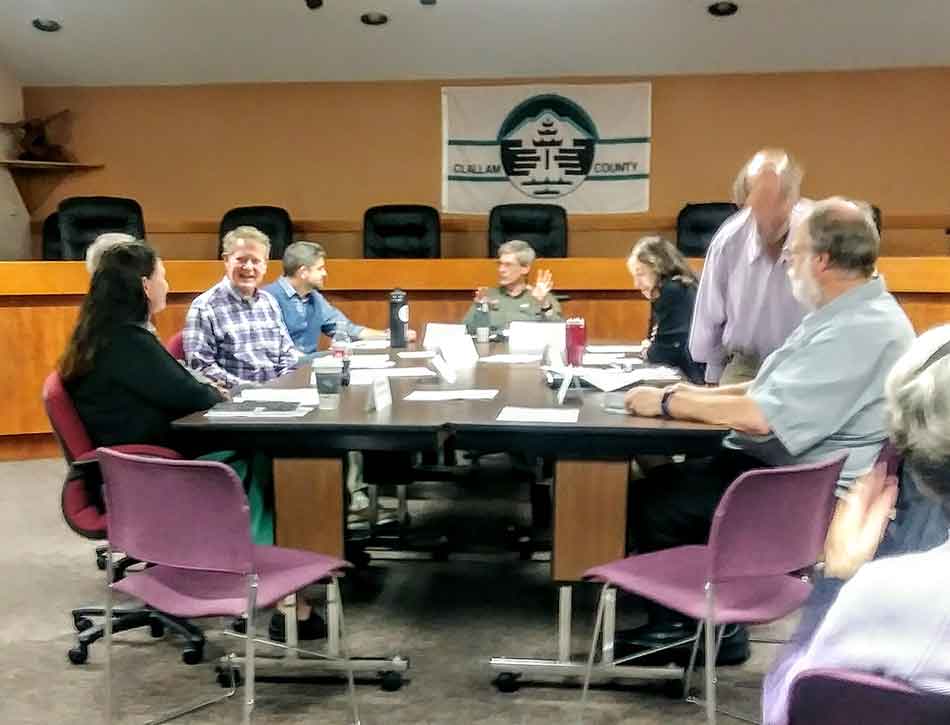Citizen Review
By Lois Krafsky-Perry and Staff
Wednesday, September, 18, 2019
Port Angeles, WA – The Clallam County Board of Health which includes county commissioners Bill Peach, Randy Johnson and Mark Ozias met September 17th to approve letters of Support, for the Medication Assisted Treatment (MAT) clinic, near the center of Sequim, on South 9th Street, which also borders Highway 101. The letters are being sent to the Jamestown S’Klallam Tribal Council and the City of Sequim.
Approximately 50 people gathered to address agenda items, such as On-site Septic System Program fees and the MAT clinic proposal.
Three people associated with the medical field testified, supporting the clinic, while 10 people testified in opposition to the MAT plans.
Dr Gerald Stephanza commenced the meeting. It was difficult to hear the board members, by those seated in the room, so microphones were then supplied for the speakers, at the urging of the attendees.
“Clallam County website has the meeting available,” announced one board member. “Is this similar to information as was printed In the paper (local)”, asked Bill Peach. He continued, “I appreciate good information.”
Bob Lake, a Sequim City Council member, who also sits on the Board of Health in an appointed position, recused himself from discussion and/or decision, however he was a sitting member of the board as decisions were made to send the letters..
“Is this a conflict of interest?” one woman wondered later to this reporter, who is against the MAT clinic, at the Sequim location.
Several suggested after the meeting that Lake may also need to recuse himself if the letter is addressed before the Sequim City Council.
Dr Allison Unthank, a family physician and Clallam County Health officer lectured the attendees with her view, about misconceptions concerning MAT. Amy Miller, a local social worker said she supported the letter in favor of the clinic.
Ten people spoke against the,”Healing Campus”, as it has been dubbed by the Tribe.
“Does this regional center have potential to destroy our town?” asked local resident Jennifer Rose. She continued, “If you build it they will come.” She reminded the board, Seattle paid $1,000,000 to ship people here. She said she believes to help people locally is the way to go. She reminded the board, “the Tribe said, we’ll take anyone”, as she referred to a recent local meeting sponsored by the Tribe. “We don’t want a tent city in Sequim. Make it regional—not local”, insisted Rose.
Dr. Crystal Tack suggested, “think about other options”.
Troy Tenneson, a third generation Sequimite and former paramedic, who is running for the Sequim City Council, urged board members to find a good way to work together.
Catherine Holt told how her family had been affected in another town, with property loss, as a result of this kind of center there. “This rural area is not enough to support them, not where you want to put it—it is not the right place,” insisted Holt.
Inga Able supplied data and statistics showing needs for other areas rather than Sequim. “There are several other counties where the needs for treatment are much greater,” announced Able.
Doreen Emerson spoke against the plan for the center and cited many problems she had witnessed with drug problems. “People need to be ready to heal, “ noted Emerson. “A regional clinic in Sequim, no”, she insisted.
“I urge you to research Canada,“ announced Catherine Mueller. “After 20 years they dropped out—-why?…consider!“ challenged Mueller.
Julie Larson, a nurse and Sequim resident for 35 years, explained some concerns about drug addiction, giving several examples. She warned, “where there are addicts, there will be dealers.” She asked the board to consider the location. Larson compared the Swinomish clinic, in Anacortes,as it is being used as a model for Sequim. “It is outside town and not a threat, but there is a threat to Sequim”.
J Everett asked who did the marketing and demographics.
Trisha Haugland, a social worker at OMC [Olympic Medical Center], offered kudos to the plan.
Josh Riley, Sequim, said, “Ron Allen (Tribal council ) admitted he did not have a plan. [This] require[s] a well thought out plan,” recommended Riley.
Commissioner Ozias, who testified at the August 9th meeting sponsored by the Tribe, said he would answer three questions being posed about MAT.
As a matter of public record, Ozias testified at that meeting that he had helped craft the MAT plan.
Acknowledging the location. “This board did not have a say in the location,” announced Ozias.
People would need to be willing for treatment and will not be forced.
“Why is there not a higher priority like a hospital?” Answer. There are a lot of reasons relating to changes on a national level. “OMC facility said it will enhance the emergency center in Port Angeles,” revealed Ozias.
Dr Gerald Stephanza noted, “access is not available at Serenity House now.” He announced that psychiatric problems will also be addressed.
Stephanza said there is a “misunderstanding about what MAT really is”, and challenged the statements made by some citizens suggesting other options, such as other services available, like abstinence programs. “That is not how it works,” challenged Stephanza. “MAT is by far the most effective action,” he said.
Commissioner Bill Peach said he would okay sending out the letter of support. Commissioner Johnson apparently did not comment at that moment. The decision was made to send the two letters.
The entire meeting can be viewed at the Clallam County website.
Or watch embedded video below.


Recent Comments